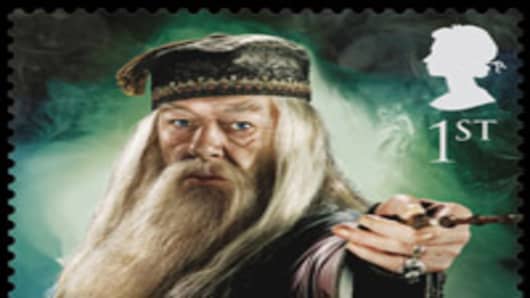J.K.Rowling’s hugely successful Harry Potter series has poured millions into the UK economy, creating jobs and waving its magic wand to help businesses post record profits.
A new series of “magical realms” stamps on sale from Tuesday features the series’ main villain, Lord Voldemort, as well as the headmaster of the Hogwarts School of Witchcraft and Wizardry, Albus Dumbledore.
But with the publication of the seventh and final book long over, filming for the final installment of the last of eight movies finalized and Pottermania losing steam, are these just ways to squeeze a last drop of blood from the Philisopher's Stone?
As the UK embarks on a plan of government spending cutsand job losses assured, the young wizard will be sorely missed by grown-up businessmen- and women as much as adolescent fans.
The Harry Potter series is not just a publishing gold mine. It has brought profits and wealth to anyone connected the adventures.
Retailers like No. 1 UK supermarket Tescoand HMV , which also owns the Waterstone’s book stores, Amazon.com and Wal-Mart Stores in the US saw sales boosted by the successful release of Harry Potter books and DVDs.
Waterstone’s, which operates through 313 stores, reported a 5 percent increase in 2008 sales compared with 2007. This growth included an estimated 0.9 percent impact from sales of "Harry Potter and the Deathly Hallows."
The group attracted more than 250,000 visitors to midnight openings to help double its market share over the previous Harry Potter book as retailers launched highly-competitive offers to beat rivals. Sales contracted in 2009 after the boost the bookstore chain got from the publication of the seventh Harry Potter title.
Publisher Bloomsbury, which holds all rights to the titles outside the US, met a similar fate.
It reported a 35 percent drop in profit in 2009 after 2008 numbers were boosted by the seventh and final Harry Potter book in paperback. For 2010, the group reported profit modestly above 2009 levels, but still 30 percent below 2008 profit. The group is hoping e-book sales will bump up its numbers this year.
The books have also been a marketer’s dream, driving sales of toys, games and clothes.
But in the UK, the Harry Potter series is probably more known for bringing big business to the British film industry.
The penultimate film in the Harry Potter series, "Harry Potter and the Deathly Hallows Part One" was the second-highest grossing film of 2010 in the UK, with box-office take of a little more than £50 million ($80 million), according to figures released by the UK film council.
The Harry Potter films received the Outstanding British Contribution to Cinema award at the 2011 Bafta awards, with organizers saying the films “defined a decade of British filmmaking”. They supported “a vast array of jobs throughout production”, Bafta said.
In 2010, Warner Bros.Pictures purchased Leavesden Studios in Hertfordshire, the Harry Potter base for the past ten years. The group has invested heavily in the studios, and is redeveloping it to include a Harry Potter tour. The franchise also provided employment in the US. “The Wizarding World of Harry Potter” opened last June in a Universal Studios theme park in Florida.(NBC Universal is the parent of Universal Studios and CNBC.)
But despite these spin-offs, it seems the Harry Potter golden age will slowly be swapped for the age of austerity.
The well of profit and opportunities the series brought to the UK will run dry. Unless Rowling has a big surprise for fans on the way.



